Victoria Police set to go to war with Andrews Government for more pay
The Police Association Victoria has branded a 2 per cent a year pay rise offer from the Andrews Government unacceptable and may consider a ban on issuing speeding fines if the dispute escalates.
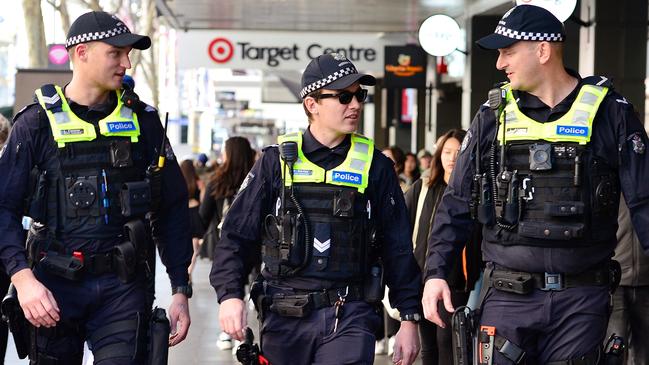
Law & Order
Don't miss out on the headlines from Law & Order. Followed categories will be added to My News.
The powerful police union is set to go to war with the Andrews Government to win an annual 4 per cent pay rise for its 17,000 members.
The Police Association Victoria — which also wants officers to be able to work four 10-hour shifts a week — has branded a 2 per cent a year government offer unacceptable and could consider a ban on issuing speeding fines if the dispute escalates.
Association secretary Wayne Gatt told the Sunday Herald Sun that to add insult to injury, the state government proposed a pay freeze for the first six months of the next four-year agreement, due to begin in November.
It means police would get nothing in the first six months of their new agreement, with no backpay once any rise kicks in.
“Police have to fight for their lives and yours, they shouldn’t have to fight for a pay rise,” Mr Gatt said.
“Punched, kicked, spat on, assaulted, rammed and abused. Our members save lives and prevent death.
“You can’t throw these men and women into the bullring of society and tell them their safety is worth less than everyone outside it.
“The message here is not only that you’re only worth 2 per cent for the work you do, but for the first six months of the next agreement, you’re worth nothing.
“We just want a fair go.”
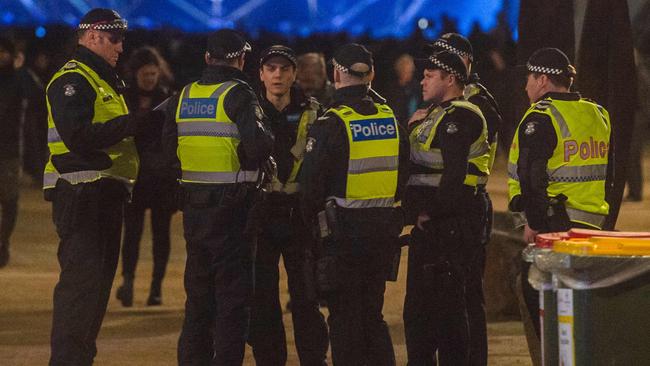
The Sunday Herald Sun understands union delegates will meet within a fortnight to discuss possible industrial action, which could include a ban on issuing speeding fines and police parking next to speed cameras with blue lights flashing to tell drivers where the cameras are.
Such a move would be aimed at cutting government revenue.
The association’s demands also include extra pay rises for sergeants and senior sergeants because of their workload and decision-making responsibilities, such as being accountable for critical-incident pursuits, family violence safety notices and job priorities.
The proposed 10-hour, four-day-a-week working roster would include two hours each shift dedicated to court or victims of crime matters.
The campaign includes a push for allowances when officers are disturbed out of hours under a new “right to disconnect” provision.
The union also wants minimum frontline staffing introduced statewide so enough police are on deck for patrols, to man police stations and respond to crime in the community.
“The government committed to this before it won re-election, it’s time to make it happen now,” Mr Gatt said.
“This is something that benefits police, the government and the community. It’s a win, win, win situation.”
On the prospect police could take industrial action, he said: “Our members are prepared to campaign for a fair and reasonable outcome. We hope that we don’t have to, but at this stage, all options are on the table.”
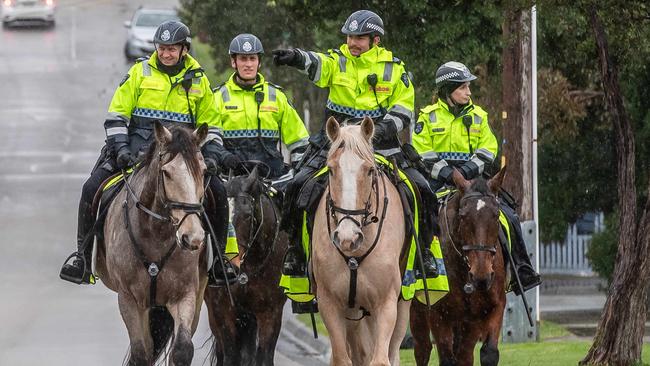
The Andrews Government has made significant increases to police numbers, but one seasoned member told the Sunday Herald Sun the job had become far more complex and pressured than when he started 25 years ago.
Mandated requirements for dealing with family violence jobs, mental health cases, runaway children in the care of the Department of Health and Human Services, and the boom in ice-related offending meant there were enormous additional burdens.
“It (demand) just never stops in some areas. The days of the divvy van just driving around checking for heads are just about over,” he said.
A Victoria Police spokeswoman said the force was negotiating in good faith for an agreement that would deliver the best results for members and the community.
“While we understand the keen community interest in this matter, negotiations are ongoing and subject to further discussion between the parties,” the spokeswoman said
The state government said in a statement: “We don’t propose to conduct our EBA negotiations through the media.”
WHAT THE POLICE UNION WANTS
A 4 per cent pay rise in each of the four years of the new deal
Additional pay increases for sergeants and senior sergeants
10-hour, four-day-a-week working roster
Allowance for disturbances outside rostered working hours
Minimum frontline staffing standards
Established career structure for PSOs
THE WORKLOAD IS NON-STOP
The Sunday Herald Sun has obtained a log of tasks for a police patrol crew at a station in Melbourne’s southeast. The log — called a running sheet — shows the officers attended almost 40 jobs in around nine hours.
The work is constant from an early start to a late finish. There is no high-level offending or grave danger on this night, just a constant stream of allocated tasks and self-generated work — with plenty of paperwork to follow.
As one police veteran says, throw in shifts with the stress of being in danger from
violent offenders and pursuits, or seeing tragedy, and it’s easy to see how
rank-and-file police members can feel enormous strain.
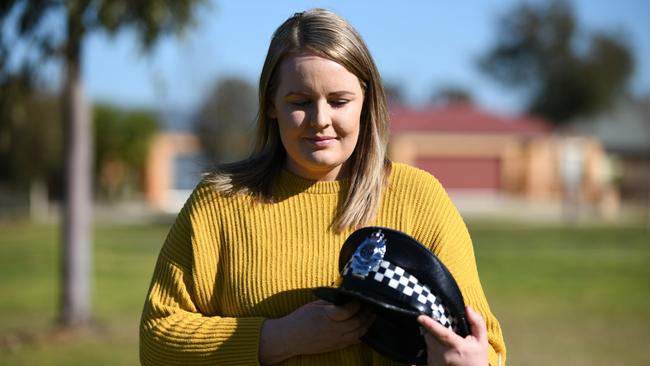

DAYS OF RISK AND REWARD
Rechelle McCartney knows just how real the risks to police are — and she’s got the scars to prove it.
The 28-year-old first constable, based at Shepparton, still bears the marks where a woman
viciously bit her during an arrest three months ago.
It took several officers to prise the attacker from the young cop’s arm.
“Before I joined the job I knew there were some risks but I didn’t expect it to be every single day — every job,’’ she said.
“It’s not just yourself at risk — it’s the people you work with as well.”
First Constable McCartney, a police officer for three years, was bitten after responding to an
argument at a Shepparton home on Mother’s Day.
Her left arm still has bruising, scarring and causes pain, but Constable McCartney said she wouldn’t be deterred from helping the community.
“It’s something I’ve always wanted to do,’’ she said.
“I still love it — I like helping people.
“I just want to make it known that I am a person.
I am not just a copper.
“People just think: ‘Oh you’re a copper, you’re in a dangerous job so you should expect this to happen’.
“But I’m also a mother and a partner and a sister and a daughter, and just because we’re in this job we shouldn’t expect this to happen.”
A 51-year-old woman of no fixed address will face Shepparton Magistrates’ Court next month in connection with the incident.
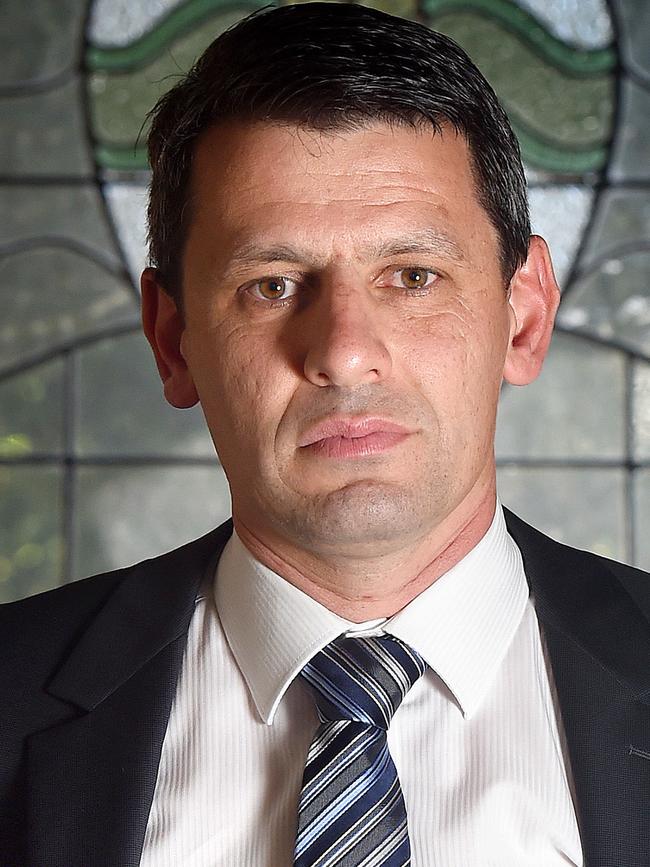
COST OF POLICING ALREADY TOO HIGH
A bad day in many jobs can lead to a bad night, or a bad week at home. A bad day in our job can mean no tomorrow.
Our members join this job primarily to help people and to protect them from the dangers of society, so that they don’t haveto confront them themselves.
They don’t do it for the glory, and as the Chief Commissioner noted in a recent radio interview, they certainly don’t do itfor the money.
But that doesn’t mean we as a society, and the government as an employer, should not fairly compensate these men and womenfor the increasingly dangerous work they perform and the increasingly volatile and unstable environment in which they do it.
Tell the constable who attends a suicide, then a fatal car crash in the same shift that 2 per cent is fair. Tell the seniorconstable who gets punched in the mouth while trying to arrest an ice-addled burglar that’s it’s enough. Tell the sergeantsand senior sergeants who are called upon constantly to make snap decisions during pursuits, family violence matters, unfoldingcrime and competing critical incidents. Tell them that their return for the 100 per cent they put into the community, deservesa return of 2 per cent. Because I won’t. They deserve better.
This Enterprise Bargaining Agreement runs much deeper than money, it’s about walking the talk when it comes to improving themental health of our members.
A four-day 10-hour shift week is a positive step in the right direction. Our police deserve the opportunity to turn off fromwork and enjoy their family and home life and to have adequate time set aside within those shifts (two hours) to completethe correspondence and court preparation that currently spills out of their shift and into their life.
We want our members less stressed, better rested and happier. And should you, your friends or your family ever find yourselfin a situation where your safety relies on their decision making, you will too.
The cost of policing to our members is already high, we mustn’t short change them further.
Wayne Gatt is Police Association Victoria secretary
